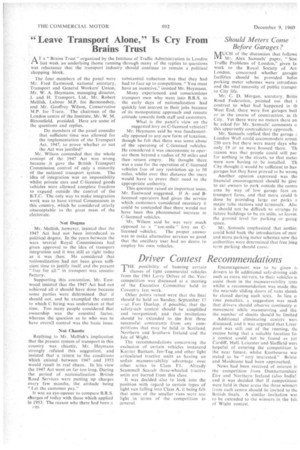"Leave Transport Alone," Is Cry From Brains Trust
Page 82

If you've noticed an error in this article please click here to report it so we can fix it.
A' a" Brains Trust" organized by the Institute of Traffic Administration in London last week an underlying theme running through many of the replies to questions was reluctance that the transport industry should continue to remain a political chopping block.
The four members of the panel were Mr. Fred Eastwood, national secretary, Transport and General Workers' Union, Mr. W. A. Heymann, managing director, J. and. H. Transport, Ltd., Mr. Robert Mellish, Labour M.P. for Bermondsey, and Mr. Geoffrey Wilson, Conservative M.P. for -Truro. The chairman of the London centre of the Institute, Mr. W. M. Bloomfield, presided. Here are some of the questions and replies.
Do members of the panel consider that sufficient time was allowed for the implementation of the Transport Act. 1947, to prove whether or not the Act was justified?
Mr. Wilson contended that the whole concept of the 1947 Act was wrong because It gave the British Transport Commission control of only a minority of the national transport system. The idea of integration was an impossibility whilst private cars and C-licensed goods vehicles were allowed complete freedom to expand outside the control of the B.T.C. The only way to make integration work was to have virtual Communism in this country, which he considered utterly unacceptable to.•the great mass of the electorate.
Not Dogma
Mr. Mellish, however, insisted that the 1947 Act had not been introduced as political dogma. In the years between the wars several Royal Commissions had given approval to the idea of transport integration and it was still as right today as it was then. He considered that nationalization had not been given sufficient time to justify itself, and the present " free for all" in transport was unsatisfactory.
Supporting this contention, Mr. Eastwood insisted that the 1947 Act had not achieved all it should have done because some parties were determined that it should not, and he exampled the extent to which C hiring was undertaken at that time. Too many people considered that ownership was the essential factor, whereas the question as to who was to have overall control was the basic issue.
Not Chaotic
Replying to Mr. Mellish's implication that the present system of transport in this country was chaotic, Mr. Heymann strongly refuted this suggestion, and insisted that -a return to the conditions which existed between 1947 and 1953 would result in real chaos. In his view the 1947 Act went on far too long. During the period of nationalization British Road Services were putting up charges every few months, the attitude being "Let the customer pay."
It was an eye-opener to compare B.R.S. charges of today with those which applied in 1953. The reason why there had been a
(46 substantial reduction Was that they had had to face up to competition. "You must have an incentive," insisted Mr. Heymann.
Many experienced and conscientious transport men who went into B.R.S. in the early days of nationalization had quickly lost interest in their jobs because of its monopolistic approach and remote attitude towards both staff and customers.
What is the panel's view on the suggested levy on C-licensed vehicles?
Mr. Heymann said he was fundamentally opposed to any new form of taxation. though he felt that there was some abuse of the operating of C-licensed vehicles. He considered it was uneconomic to operate them beyond a radius of 50 miles and then return empty. He thought there was a case for the operation of C-licensed vehicles free of any restriction up to 50 miles, whilst over that distance the users would have to prove their need to the appropriate authority.
This question raised an important issue, Mr. Eastwood suggested. If Aand Blicensed operators had given the service which customers considered necessary it cold be contended that there would not have been this phenomenal increase in C-licensed vehicles.
Mr. Wilson said he was very much opposed to a " ton-mile " levy on C licensed vehicles. The proper answer was to make alternative services so good that the ancillary user had no desire to employ his own vehicles.
























































































































